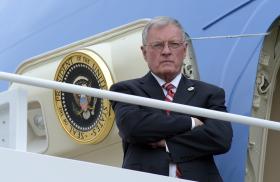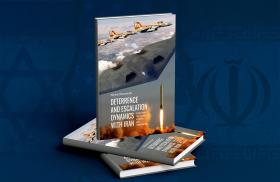
- Policy Analysis
- PolicyWatch 4043
Setting Expectations with Syria on Countering the Islamic State

After an encouraging Trump-Sharaa meeting, Washington and its partners must now facilitate the complex work of creating timelines and implementing new security arrangements to constrain the jihadist group.
May has been a roller-coaster month for U.S. policy in Syria, with promising highs and tragic lows in the past two weeks alone. Just days after President Trump and President Ahmed al-Sharaa celebrated a new chapter in bilateral relations, Islamic State operatives set off a car bomb on May 18 that killed Syrian security personnel in Mayadin, marking their first successful strike against the new government. The incident was a stark reminder that even as officials turn their attention to the political process, they cannot lose sight of the counter-IS mission, which has been a central part of U.S. policy in Syria since 2014.
The White House has already urged President Sharaa to help prevent an IS resurgence and assume responsibility for detention centers holding thousands of IS members and affiliated individuals in the northeast. The challenge now is to clarify how Damascus should respond to these expectations on the ground, set a clear timeline for implementation, and coordinate with U.S. partners in the region and beyond.
The Evolving U.S. Approach Since 2014
Since IS burst onto the scene in 2014, the United States has been at the forefront of countering the group, becoming the largest donor to the Global Coalition and leading allied military forces through Operation Inherent Resolve in partnership with local actors in Syria and Iraq. In Syria, Washington’s partner of choice has historically been the Kurdish-led Syrian Democratic Forces (SDF). After the U.S.-led coalition ousted IS from its last territorial enclave in March 2019, the U.S. military transitioned to a lighter footprint focused on training and advising local partners to carry out the counter-IS mission and reduce U.S. troop capacity.
The Islamic State’s military defeat spawned one of Syria’s most serious challenges, which remains unresolved today: the SDF’s detention of tens of thousands of IS-affiliated men, women, and children from more than sixty countries. Thus, according to U.S. Central Command, the IS problem can now be divided into three parts, the latter two of them interconnected:
- “IS at large”—leaders and operatives fighting the United States and its partners Iraq and Syria
- “IS in detention”—thousands of IS-affiliated men and boys (and sometimes women and girls) held in Iraqi and Syrian detention facilities and youth “rehabilitation” centers
- The “potential next generation of IS”—tens of thousands of primarily women and minors held in the al-Hol and Roj detention camps in northeast Syria
Both Trump administrations have teased a withdrawal from Syria. In the interim, in March 2023, CENTCOM head Gen. Michael Kurilla said, “If we were to leave Syria and if the SDF could not fight ISIS by themselves, you could see a break out of the prisons. You could see the radicalization in al-Hol. And it is our estimate that ISIS would return in 1 to 2 years.” But with the Assad regime gone, Syria today is a dramatically different place, tinged with hope that the new government in Damascus can unify and stabilize the country, even as steep challenges remain. All this comes as Washington has begun to draw down the Global Coalition’s mission in Iraq, a move that by extension limits its ability to operate in Syria. An overhaul of U.S. foreign assistance, including cutting or freezing funds used for the detention camps and repatriation process, adds another layer of risk.
Faced with a severe humanitarian crisis, Damascus is not ready to take on the three-pronged counter-IS mission alone. A new U.S.-Syria relationship therefore requires that Washington lay out a clear plan for fighting IS and ensuring the security, and eventual depopulation, of detention facilities and camps in northeast Syria.
Different Actors, Agendas for Countering IS
While Washington has long shouldered much of the military and financial burden of countering the Islamic State in Syria, early messaging during the second Trump administration prompted other international actors to put forth their own agendas:
Damascus. The new Syrian government has already taken steps to fight the IS insurgency, including by using actionable U.S. intelligence to target the group’s militants. Such moves are important because they could alleviate U.S fears about Sharaa’s former association with al-Qaeda as well as IS. Yet the monumental task of state-building leaves open the question of whether Damascus can realistically take over the entirety of the counter-IS mission—and whether it even wants to do so—including the SDF detention centers housing IS affiliates and their families.
SDF. Washington’s main partner on the ground, the Syrian Democratic Forces, has been a vital part of the counter-IS mission, helping to defeat the group militarily and secure detention facilities and camps amid slow efforts by international actors to repatriate their citizens. But the SDF is not a state, and it has faced challenges associated with local governance and from Turkey, which considers the group an extension of the widely designated—although recently disbanded—Kurdistan Workers Party (PKK). The situation in the camps has worsened since Assad’s fall, leaving them vulnerable. Without U.S. support, the SDF risks falling into direct confrontation with Turkey, which would render it incapable of continuing the counter-IS mission.
Turkey and Iraq. These two neighbors of Syria have also pushed their own agendas. Seizing on ambiguous messaging from Washington after Assad’s ouster, Turkey proposed a regional platform wherein it would take the reins of the Global Coalition along with Iraq, Jordan, and Syria. This move was aimed simultaneously at sidelining the SDF and minimizing European influence. But Turkey’s potential partners were dissuaded from participating after initial meetings made clear that Ankara sought to exceed the counter-IS mandate by also going after remnants of the PKK. Further challenges for these two countries include Ankara’s inability to carry out such a mission alone, Baghdad’s wariness—as the American-led mission winds down in Iraq—of the Sharaa government’s ability to fight IS, and the more than 15,000 Iraqis who remain in SDF-run detention facilities and camps.
Europe. The U.S.-led military mission in Syria has been supported by France and the United Kingdom. When Washington was slow to clarify its Syria policy after Assad’s overthrow, European actors pushed for sanctions relief and proposed their own alternatives, including the continuation of Operation Inherent Resolve in coordination with the new Syrian government. Syrian coordination with the coalition is now looking more likely, judging from the readout of the May 14 Washington-Damascus meeting, which indicated that the Syrian government should “help” the United States prevent an IS resurgence. This said, neither the European Union as a whole nor any of its countries is capable of taking on the counter-IS mission.
Recommendations
As Washington turns to Damascus to help fight the Islamic State and assume control of Syria’s detention facilities and camps, U.S. officials and others must be mindful of several priorities:
- Damascus needs to demonstrate an ability and willingness to take over the counter-IS mission. To this end, the United States should convene a bilateral working group meant to address the three parts of the mission: (1) IS insurgency, (2) IS fighters in detention facilities, and (3) IS-affiliated families in detention camps. Syrian officials must make clear their intent not only to assume the entire mission, but also to ensure security and humane treatment for detainees.
- Washington and its allies must communicate the necessity of a healthy Damascus-SDF relationship. As the United States looks to lighten its footprint in the Middle East, Washington has articulated the need for Damascus to work with the SDF. But little actual progress has followed an initial Damascus-SDF integration agreement signed in March. This is partly because the SDF has viewed its role in the counter-IS mission—specifically, in the detention facilities and camps—as both a burden and a negotiating tool to be used against Damascus and international actors. Meanwhile, Damascus does not feel pressured to concede to the SDF, and has not acknowledged the Kurdish-led group’s military training and experience in the counter-IS mission. Yet as it stands now, neither Damascus nor the SDF could carry out the counter-IS mission alone, and they must make their relationship work to allow for a successful U.S. handover.
- The United States should demand that Turkey cease actions that risk an IS resurgence. From using military aggression against the SDF to prioritizing its anti-PKK agenda and sidelining U.S. and European allies by proposing new coalitions, Turkey has sometimes undermined the broader fight against IS—and Washington must make clear to Ankara that this is unacceptable. On this count, the May 20 U.S.-Turkey working group on Syria offered Washington a key opportunity to clarify aspects of Turkey’s activities that have endangered the shared goal of preventing an IS resurgence.
- America should not sideline partners in Europe. While President Trump has praised the roles played by Saudi Arabia and Turkey in Syria’s transformation, Washington should not lose sight of Europe’s substantial counter-IS efforts. Washington must therefore keep working with European capitals to ensure policy alignment with respect to Damascus, while also asking them to carry more of the financial burden. For their part, European countries must prioritize the repatriation of their citizens in order to lessen the onus on Syria.
- Washington needs to be realistic regarding a timeline. The counter-IS mission requires training, equipment, intelligence support—and time. As such, both the U.S. Defense Department and State Department must be enlisted to set up a realistic timeline for a process that slowly assigns more control to the Syrian government.
Devorah Margolin is the Blumenstein-Rosenbloom Senior Fellow at The Washington Institute. She recently appeared on the “Hope for al-Hol?” episode of the Institute’s Syria Breakdown video series.



